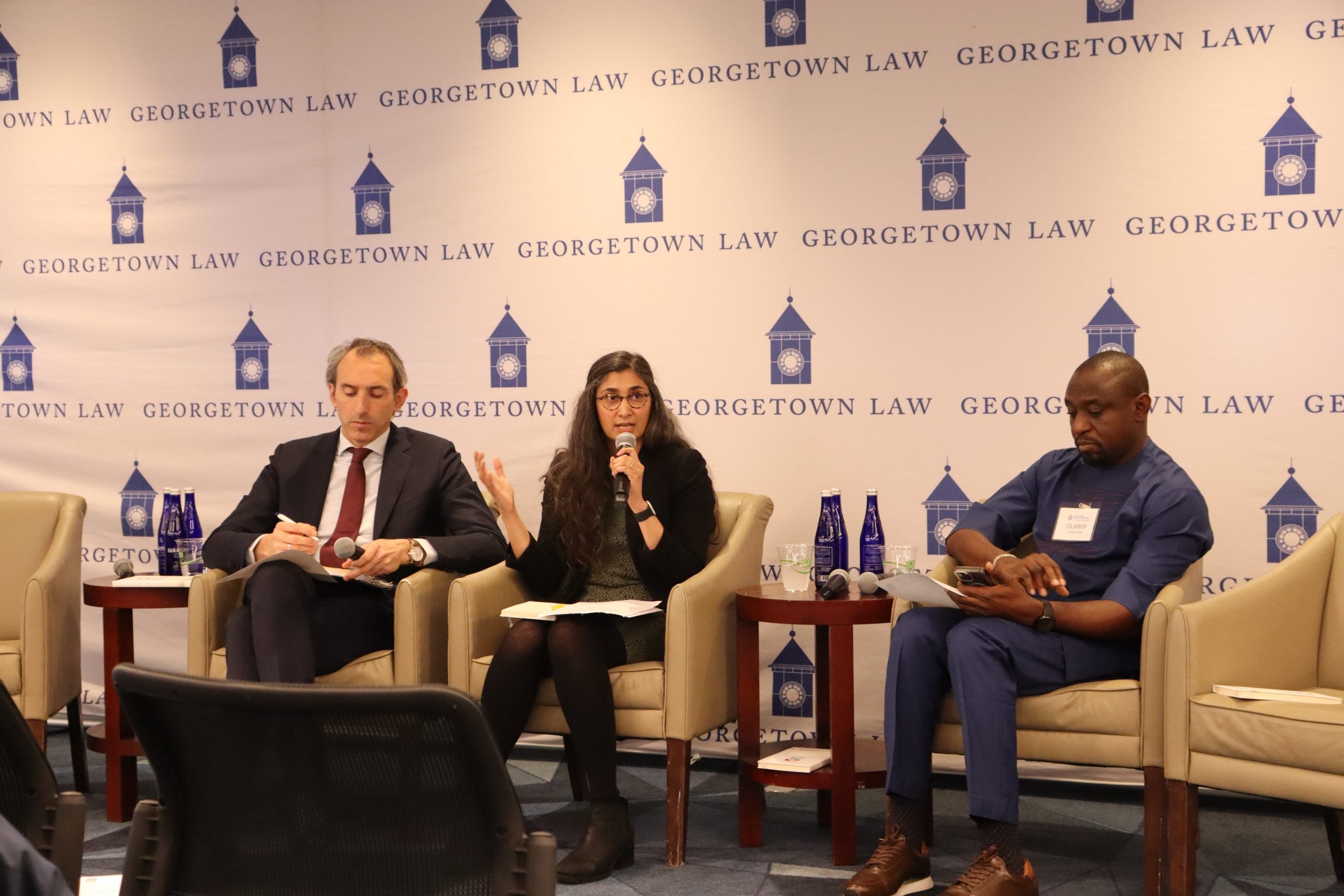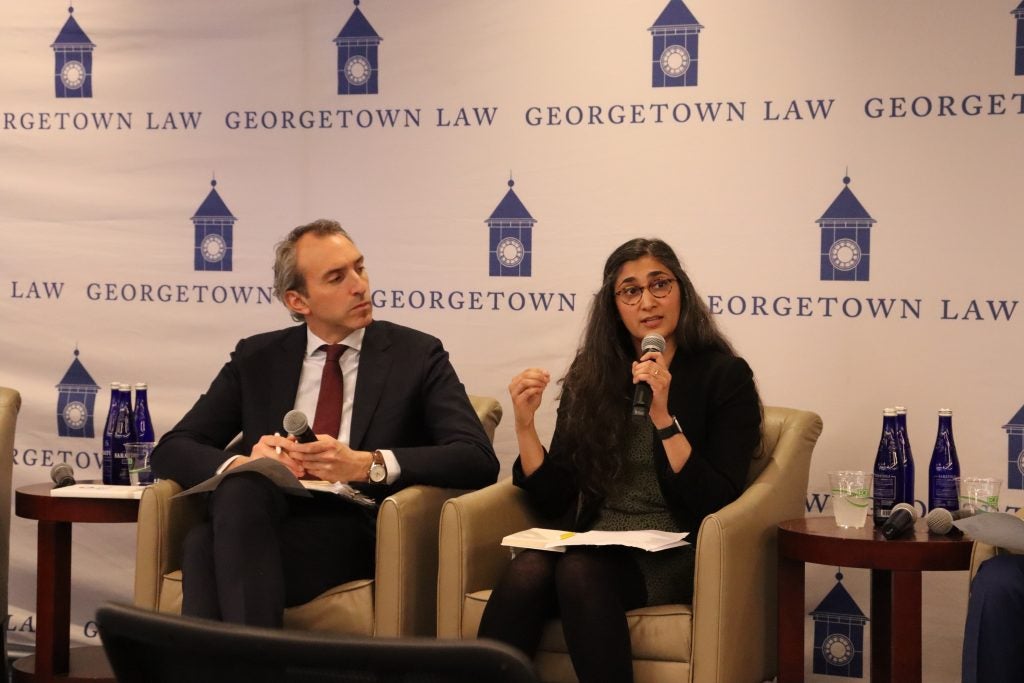The Rise of Subsidies and the Clash of Industrial Policy: Are International Rules Still Relevant?

From left to right: Rem Korteweg, Inu Manak, and Olabisi Akinkugbe
Published May 9, 2024 by Elizabeth Butscher
The Center on Inclusive Trade and Development (CITD) held its second annual Rethinking World Trade conference on Wednesday, April 3rd. In addition to a book launch and a panel on U.S.-China relations, we hosted a panel discussion on subsidies and industrial policy. As economies around the world seek to reduce economic dependencies and enhance economic security while moving towards decarbonization, the resurgence of industrial policy, including subsidies, is evident. The panel featured Olabisi Akinkugbe, Professor of Law at Dalhousie University, and Inu Manak, the Fellow for Trade Policy at the Council on Foreign Relations. The discussion was moderated by Rem Korteweg of the Clingendael Institute.
While industrial policy has always played a role in the global trade landscape, its recent expansive use—especially in the U.S.—is notable. The CHIPS and Science Act and the Inflation Reduction Act (IRA) in the U.S., parts of the European Green Deal, and even the Belt and Road Initiative in China, exemplify the large-scale subsidy programs influencing trade today. In the U.S., industrial policy seems to be driven primarily by a growing distrust in the market and perceptions of domestic industrial decline, amid increasing bipartisan concerns over Chinese competition. In Europe, the politics of industrial policy appear to be driven less by an anti-China sentiment. However, the rise of far-right political parties in Europe also suggests the instrumentalization of industrial policy as a means to address foreign competitive pressures. Compared to the industrial policies of the late 1990s, the subsidies of today have a greater focus on climate change through decarbonization and revitalizing value chains due to COVID-19.
The use of large-scale subsidy programs is often discouraged, especially in the trade policy domain where it is typically associated with trade wars. Professor Akinkugbe pointed out that developing countries are often caught in the middle of these wars, resulting in deeper economic disparities. The success of industrial policy depends on the privileged economic position of the countries implementing such policies. As Manak argued, industrial policy often fails no matter the money spent implementing it because many of these policies lack a cost and benefit plan and measurable objectives to ensure success. Investing in policies without the mechanisms to properly measure success may ultimately prove fruitless, and for some countries, such an approach may not even be possible.

Rem Korteweg and Inu Manak
Despite the costs, industrial policy has played a key role in discussions on decarbonization, with many experts arguing that it is not only desired, but also necessary for achieving decarbonization goals. The IRA is an example of a subsidy package that directly impacts the energy industry in the U.S. with the intent to curb climate change in addition to supporting domestic industry. However, subsidies on this front could be trade distorting. As a substitute to classic industrial policy that may have fewer trade distorting effects, the European Union introduced its Carbon Border Adjustment Mechanism (CBAM), a carbon pricing mechanism that has the potential to become the path that other countries follow as a solution to the trade-related climate crisis. Even the U.S. is starting to take an increased interest in a domestic carbon price.
Professor Akinkugbe emphasized the need for inclusive policies that consider the interests of developing countries. For African countries specifically, modest steps forward would be the most effective approach, as green procurement is generally not on the table at the moment. Removing key industries from developing countries in the name of decarbonization could severely impact their economies. Many countries lack the means to fully commit to large-scale decarbonization efforts without significantly affecting their prospects for economic growth.
With the rise of industrial policy linked to decarbonization policies, there is an expected increase in the number of subsidies. In this context, both Manak and Professor Akinkugbe anticipate a shift away from multilateral negotiations, toward targeted, bilateral deals on subsidies. While this trend is likely to arise from pragmatic considerations, it carries the risk of creating fragmented rules that may conflict with one another, potentially increasing tensions with other countries not involved in these agreements. This approach may also signal a lack of confidence in the multilateral trading system, prompting developing countries to follow suit, thereby further weakening the system. Focusing solely on domestic concerns while ignoring the need for global consensus on decarbonization and climate change could undermine efforts to address these challenges effectively. While the future of subsidies and their impact remains uncertain, countries must begin to grapple with the tensions introduced by industrial policy to establish an equitable trading system that supports the preservation of the planet for future generations.
